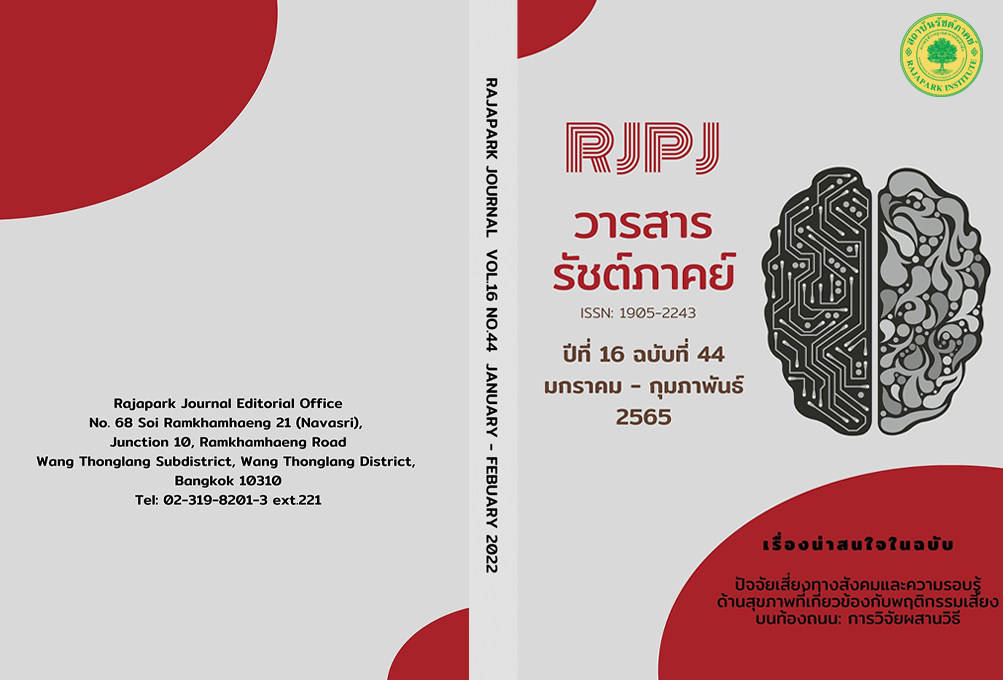อิทธิพลของการบริหารเวลา การเห็นคุณค่าในตนเอง การรับรู้ความสามารถในตนเองที่มีต่อความสุขในการทำงาน
Main Article Content
บทคัดย่อ
การวิจัยครั้งนี้มีวัตถุประสงค์เพื่อวิเคราะห์ความสามารถในการทำนายความสุขในการทำงานด้วยการบริหารเวลา การเห็นคุณค่าในตนเอง และการรับรู้ความสามารถในตนเอง โดยเป็นการวิจัยเชิงสำรวจ ประชากรที่ใช้ในการศึกษา ได้แก่ ผู้มีงานทำในเขตกรุงเทพมหานคร สุ่มกลุ่มตัวอย่างด้วยวิธีการสุ่มแบบบังเอิญ (Accidental sampling) ได้กลุ่มตัวอย่างทั้งสิ้น 400 คน เครื่องมือที่ใช้ในการวิจัยเป็นแบบสอบถาม มีค่าความเชื่อมั่นเท่ากับ 0.945 สถิติที่ใช้ในการวิเคราะห์ข้อมูล คือ การวิเคราะห์การถดถอยพหุคูณ ด้วยวิธีการ Stepwise ผลการศึกษา พบว่า การบริหารเวลา การเห็นคุณค่าในตนเอง และการรับรู้ความสามารถในตนเอง สามารถร่วมกันทำนายความสุขในการทำงานได้ มีค่าอำนาจในการทำนายร้อยละ 43.1 โดยกำหนดสมการถดถอย คือ ความสุขในการทำงาน = .360 + .321 (การรับรู้ความสามารถในตนเอง) + .250 (การเห็นคุณค่าในตนเอง) + .190 (การบริหารเวลา) ซึ่งเป็นองค์ความรู้ให้กับองค์กรสมารถนำไปกำหนดนโยบายในการส่งเสริมความสุขในการทำงานด้วยการพัฒนาบุคคลกรภายในองค์กรให้ตระหนักในการเห็นคุณค่าในตนเอง การับรู้ความสามารถของตนเอง และสามารถจัดสรรเวลาในการปฏิบัติงานกับเวลาส่วนตัวให้มีประสิทธิภาพต่อไป
Article Details

อนุญาตภายใต้เงื่อนไข Creative Commons Attribution-NonCommercial-NoDerivatives 4.0 International License.
ทัศนะและความคิดเห็นที่ปรากฏในวารสาร ถือเป็นความรับผิดชอบของผู้เขียนบทความนั้น และไม่ถือเป็นทัศนะและความรับผิดชอบของกองบรรณาธิการ
เอกสารอ้างอิง
Ahmed, M. A. (2012). The Role of Self-esteem and Optimism in Job Satisfaction among Teachers of Private Universities in Bangladesh. Asian Business Review. 1(1), 114–120.
Bandura, A. (1977). Self-efficacy: Toward a Unifying Theory of Behavior Change. Psychological Review. 84(2), 191-215.
Boonyavichit, J. (2001). Effective ways for time Management. Suthiparithat Journal, 15(47), 52-55.
Bumrungyart, R., & Chunin, M. (2014). Achievement Motive and Adversity Quotient Predicting Happiness at Work of Employees in Transportation Organizations. Chandrakasem Rajabhat University Journal, 20(38), 107-116.
Chuakawejinda, P. (2016). Self-esteem of Street Sweepers Bangkok Metropolis(Thesis in Master of Arts, Social Research). Thammasat University.
Chuensuan, P. (2011). Relationships Between Spiritual Quotient, Self-esteem and Joy at Work of Flight Attendants at Thai Airways International Public Company Limited(Independent Study in Master of Art, Industrial and Organizational Psychology). Thammasat University.
Claessens, B. J.C., van Eerde, W., Rutte, C.G., & Roe, R. A. (2007). A Review of the Time Management Literature. Personal Review, 20(2), 255-276.
Dasa, J. (2009). Happy Workplace. Retrieved from, http://www.vcharkarn.com/varticle/39142
Eiaumbamrungsakul, I. (2015). Self-Esteem and Perception of Organizational Support Predicting Happiness at Work of Employees(Thesis in Master of Arts, Industrial and Organizational Psychology). King Mongkut’s University of Technology North Bangkok.
Fuengfupong, K. (2011). Perception of Self-efficacy, Optimism and Job Engagement: A case study of Employees of Personal and Health Care (Independent Study in Master of Art, Industrial and Organizational Psychology). Thammasat University.
Gavin, J. H., & Mason, R. O. (2004). The Virtuous Organization: The Value of Happiness in the Workplace. Organizational Dynamics, 33(4), 379-392.
Jindapun, A. (2012). Management-Time Management. Journal of Graduate School Sakon Nakhon Rajabhat University, 10(48), 195-198.
Jitmun, C. (2014). The Relationship Between the Self-esteem, Quality of Work Life affects the Work Happiness of Employees of Krung Thai Bank Public Company Limited, Ratchathewi District, Bangkok(Thesis in Master of Science, Industrial psychology and Organization). Ramkhamhaeng University.
Kawchaisa, N., Hemrungrojn, S., & Buathong, N. (2018). Work Happiness and Organizational Commitment in the Import and Distribution Company. Chulalongkorn Medical Journal, 62(6), 987-999.
Kittiwongsunthorn, K., & Deeprasert, J. (2017). Factors in Performance and Work Happiness of employees in Accounting Units, Thai Airways International Public Company Limited. In The National Academic Conference “Integrating Knowledge for Sustainable Development” No.1/6 Social Sciences and Interdisciplinary, March 24, 2017, (pp. 53-61). North Bangkok University.
Lhokam, P. (2007). Time Management Capacities of Undergraduate Students of Srinakharinwirot University (Thesis in Master of Education, Higher Education). Srinakharinwirot University.
Muealamai, S. (2013). Self-efficacy, Job Characteristics, Organizational Climate Affecting the Work Engagement of Registered Nurses at Ramkhamheang Hospital. Dusit Thani College Journal, 7(2), 68–90.
Noikhamyang, C., & Noikhamyang, P. (2012). Factors Affecting Work Happiness Index of the Library Staff at the Central Library, Srinakharinwirot University. Bangkok: Srinakharinwirot University.
Ozguner, Z., & Ozguner, M. (2014). A Managerial Point of View on the Relationship Between of Maslow’s Hierarchy of Needs and Herzberg’s Dual Factor Theory. International Journal of Business and Social Science, 5(7), 207-215.
P. A. Payutto, B. (2017). Work Gets Results, People are Happy (4th ed.). Bangkok: Amarin Dhamma.
Pantapalangkura, P. (2015). How to Make Employees Happy at Work?. Retrieved from https://www.bloggang.com/mainblog.php?id=hrman&month=15-02-2015&group=4&gblog=331
Phowitthayakan, K., Buapetch, A., & Isaramalai, S. (2016). Factors Influencing the Happiness in Working among Industrial Workers of Rubber Wood Industry in Muang Yala. Prince of Naradhiwas University Journal, 8(1), 1-15.
Pimpaporn, T., & Chantuk, T. (2016). The Challenge for Human Resource Management in Hospitality Industry. Journal of Humanities & Social Sciences Review, 18(2), 113-126.
Sintanapanya, A., Songbundit, A., Boonthima, R., & Supakit, V. (2014). Happiness Management in School. Suthiparithat Journal, 22(88), 15-32.
Sirichotiratana, N. (2017). Principles of Human Resource Management in the 21st Century (3rd ed.). Bangkok: Chulalongkorn University Printing.
Shilpa, S. N., & Prasad, R. (2017). Self efficacy, perceived stress and happiness among students. In 2017 International Conference on Advances in Computing, Communications and Informatics (ICACCI) (pp. 2105-2109). IEEE.
Strategy and Evaluation Department, Bangkok Metropolitan Administration [BMA]. (2017). Statistics 2016 Bangkok Metropolitan Administration. Bangkok: Strategy and Evaluation Department.
Sun, Y., Gergen, E., Avila, M., & Green, M. (2016). Leadership and Job Satisfaction: Implications for Leaders of Accountants. American Journal of Industrial and Business Management, 6, 268-275.
Suranaree University of Technology. (2016). 5 Ways to Manage Your Time Effectively. Retrieved from http://coop.sut.ac.th/files/academic2559/04.pdf
Thongyoo, D. (2014). Guideline for Developing Adolescent Self-Esteem Based on Self-Efficacy Theory. Valaya Alongkron Review, 4(2), 179–190.
Wesarat, P., Sharif, M.Y., & Majid, A. (2015). A Conceptual Framework of Happiness at the Workplace. Asian Social Sciences, 11(2), 78–88.
Wongmongkorn, T., & Butsuwan, J. (2011). The Relationship Between Efficiency of Time Management, Stress at Work and Performance of Personnel of the Faculty of Science Management, Rajabhat Maha Sarakham University. Maha Sarakham: Research and Development Institute, Rajabhat Maha Sarakham University.
Wongsuryrat, C. (2011). Relationships Between Quality of Working Life, Happiness at Work, and Flow State as Moderator: Case Study in an Engineering, Procurement, Installation and Commissioning (EPIC) Company in Oil & Gas Business Industrial, Bangkok Office(Independent Study in Master of Art, Industrial and Organizational Psychology). Thammasat University.
Yamane, T. (1967). Statistics: An Introductory Analysis. (2nd ed.). New York: Harper and Row.


